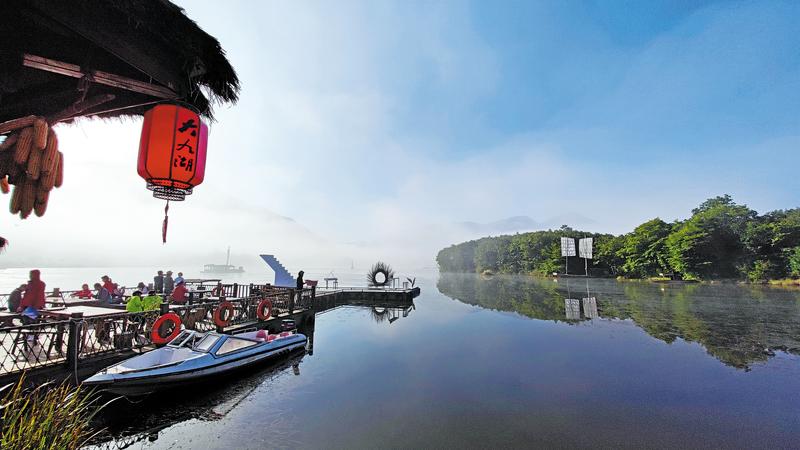 (SONG CHEN / CHINA DAILY)
(SONG CHEN / CHINA DAILY)
When Lu Deyan was born more than 50 years ago in a remote village in Hubei province, his family lived in a lakeside home amid beautiful scenery.
However, the stunning views in Dajiuhu, which translates as “nine big lakes”, located in the Shennongjia forestry area, failed to bring good fortune. Life was hard and the villagers, including Lu’s family, were poor.
Lu toiled many hours day and night as a lumberman, migrant worker and farmer, but struggled to make ends meet. “I worked hard but made little money,” he said.
His fortunes turned when tourists flocked to the area, willing to spend money on overnight stays to watch the sunrise over the lakes.
Sensing opportunity, Lu opened a homestay in 2010. The small business had only a few beds and tables, but through it, the annual income of Lu’s family reached 70,000 to 80,000 yuan (US$10,341 to US$11,320 at today’s exchange rates) — enough to pay for his son and daughter to go to college.
Happy with his new life, Lu thought he had “turned the corner”.
But in 2013, a newly announced restoration project required all villagers living in Dajiuhu National Wetland Park in the Shennongjia Nature Reserve to relocate to a township 20 kilometers away.
Launched by the Hubei provincial government, the project aimed to eliminate pollution, minimize human disturbances to nature, and ultimately restore forest and wetland ecosystems.
Environmental problems resulted from development in Shennongjia — an important logging area in Central China — in the 1960s.
Trees were felled for use as railroad ties. Although logging was banned in 2000, closing timber businesses, it failed to stop environmental harm.
To benefit from higher prices, villagers planted off-season vegetables around the lakes. Trenches that drained water from the soil to plant radishes and cabbages severely damaged the wetland.
Since 2010, homestays and restaurants around the lake had increased considerably, with sewage and waste discharged into the wetland directly.
The Dajiuhu wetland, northwest of Shennongjia, features nine different-sized lakes, surrounded by mountains.
In 2006, Dajiuhu became the first national wetland park in Central China, and four years later a provincial nature reserve. It was deemed an important area in 2013 by the Convention on Wetlands of International Importance, also known as the Ramsar Convention, an intergovernmental treaty espousing sustainable use of such areas.
Zhang Zhiqi, deputy director of the Shennongjia National Park Science Academy, said: “Wetlands are the ‘kidneys of the earth’, as they can restore natural functions and are very important for ecosystems.
“But when the villagers dug trenches to make the soil more suitable for farming and to plant their vegetables, they destroyed the wetland’s hydrological environment.
“The homestays also produced a large amount of domestic waste, which was directly discharged into the lakes,” Zhang said, adding that restoring the lakeside environment took time.
“Shennongjia covers 3,253 square kilometers — just 1.7 percent of the total area of Hubei, but it is home to more than 90 percent of the plant species in the province,” Zhang said, emphasizing the importance of Shennongjia, not just to Hubei, but the whole country.
In 2016, authorities decided to shut down all businesses in the Dajiuhu National Wetland Park to “return the lakes to nature”. A township was built at the foot of the mountains where villagers were encouraged to run tourism-related businesses, including hotels and restaurants.
Although officials and scientists saw the urgent need to relocate residents to protect the lakes and forests, villagers like Lu Deyan were reluctant to move.
“I was born and raised here, as were my father and grandfather,” Lu said, explaining the family’s attachment to the land.
Moreover, he had doubts about the future. “What if I cannot earn a living after being relocated?
“I’m stubborn. I had a good life, so why change? I was now earning more money than before, so if I moved, would life be better?”
 Tourists visit Dajiuhu National Wetland Park in Shennongjia, Hubei province. Seven years ago, villagers living in the park were relocated to a township 20 kilometers away. (DONG XIAOBIN / CHINA NEWS SERVICE)
Tourists visit Dajiuhu National Wetland Park in Shennongjia, Hubei province. Seven years ago, villagers living in the park were relocated to a township 20 kilometers away. (DONG XIAOBIN / CHINA NEWS SERVICE)
Officials responsible for relocation visited Lu’s home, underlining the importance of environmental protection to persuade him. However, Lu feared he would fall on hard times again and remained haunted by uncertainty.
Zhang Mingguo, a village official and Lu’s nephew-in-law who took part in relocation assignment work said: “At family gatherings, he refused to talk to me because it was impossible to avoid the subject.”
But when villagers built hotels in the township and started to make money, Lu questioned his decision to stay.
Often visited by local officials, Lu gradually realized the importance of the environment and the need for change.
Some of his homestay clients persuaded him to move.
“They were widely traveled and had foresight. A client with a degree told me that if I refused to move and continued to run the business, in the long run, I would fail,” Lu said.
The client told Lu the outside world treasured clean water and a good environment; if the villagers continued to discharge waste into the wetland, the lakes and forests would perish and no one would benefit.
Lu finally agreed to move in 2015, two years after the campaign started. Today, he can proudly afford to send his children to college and beams that his son-in-law is the village’s first graduate student.
By September, more than 460 families had moved to the township. The remaining dozen will do so by year’s end.
Relocation was also difficult for local officials, as there were more residents who refused to move.
Liu Yong, president of Dajiuhu township people’s congress, who led the campaign, said: “Without the forests, their land and the traditional farming life they were familiar with, villagers were fearful about the future.
“Many families were reluctant to make decisions. They waited to see how others were doing and what their neighbors were asking for.”
Zhang, the village official, found it hard to strike a balance between villagers’ demands and the standards set by the authorities.
“Some families asked for an unreasonable amount of compensation, for example, 1 million yuan, which was impossible under the relocation standards,” Zhang said.
In one such case, he and a colleague knocked on a villager’s door every day for two months and spoke to the man’s friends and relatives. The family agreed to move on the condition that the villager and his wife become sanitation workers at the park shuttle transfer center.
To better implement the campaign, the local government set up a committee to handle relocation. It comprised villagers with family ties or a strong network in the local community.
Officials frequently explained the need to protect the environment and lead sustainable lives, but many shut their doors in the bureaucrats’ faces.
Negotiations were carried out. Villagers sold their assets, including houses and land, to the government.
Professionals assessors calculated villagers’ assets and drew up a plan for compensation, paid for by the authorities.
A hectare of farmland was valued at 300,000 yuan and 1 hectare of the forest at 3,000 yuan. While the State owned land and forests, local farmers had the right to use these for farming and raising livestock.
Families that received less than 300,000 yuan in compensation could apply for low-interest bank loans.
Zhang Kun, head of Dajiuhu township, said constructing a three-story building in the town costs about 300,000 yuan. “A standard was set for locals to have at least enough money to build a house and start a new life in the tourism business.”
Zhang Zhiqi, the park’s science academy deputy director, along with colleagues built dikes to divert water to the lakes to restore the wetland.
He said the wetland, reliant mainly on self-restoration, has benefited from the reduced human presence since relocation began.
As they walk through the town, local officials Zhang and Liu are often thanked by smiling residents.
“My friends and relatives said they wished they could have moved earlier,” Zhang said.
Lu Deyan, now living 20 km from his old home, is among those enjoying the benefits. He invested all his savings and spent a year building his business, a four-story, 21-bedroom hotel. After another year on interior decoration, it opened in 2017.
“Business in the first year was amazing. I earned 500,000 yuan — way beyond my wildest dreams,” Lu said, now worried about how to spend so much money.
“I used to travel by bus and slow train to do seasonal jobs for a living, but now I take airplanes, high-speed trains, and have money to spend. I used to live in a shabby house and had no savings. Now, I live in a hotel.”
Lu travels in his spare time, and during slack periods sometimes closes his hotels and restaurants. He has gone on trips to Hainan, Jiangxi and Hunan provinces, and visited Yangtze River Delta areas, including Shanghai and Hangzhou, capital of Zhejiang province. Considering overseas travel, he recently applied for a passport with plans to visit a different country each year before retiring at 60.
Lu opened two savings accounts for both his grandsons and deposits 100,000 yuan to them yearly.
“My wife and I have been through very difficult times. I hope my grandsons don’t have to toil all their days. They should have a better start and receive more education than their grandfather and grandmother,” he said.
Contact the writers at luowangshu@chinadaily.com.cn


